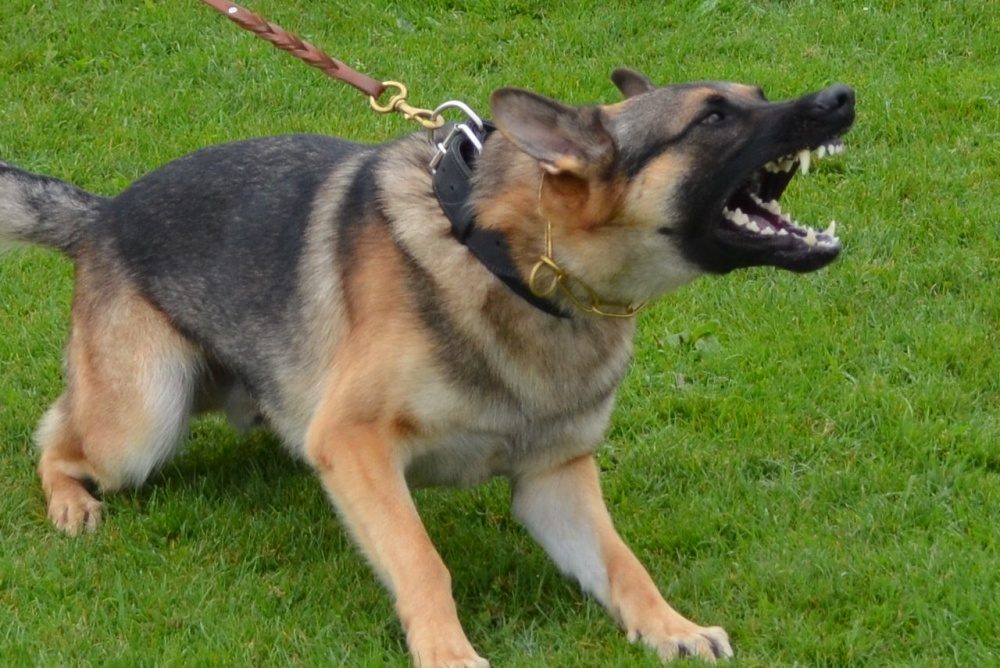How To Stop German Shepherd Dog Aggression

So you have had your German Shepherd for a while and you are enjoying how quickly he is growing and learning so quickly. You also notice a trend in his behavior, one where you suspect that he is starting to reveal a dog aggression behavior you have never seen. Now you are wondering how to deal with this condition questioning yourself on how to stop this behavior before it gets out of hand.
How German Shepherd Aggression Begins
Did you know that as early as 6 weeks old, dog aggression can show its ugly signs? During this time the puppy should be learning to socialize with its pack and given the proper training that will keep them from biting other people. The socialization period can be as little as 14 weeks of age or longer for the puppy to be taught about its behavior.
14 weeks is a good time frame to teach your puppy the proper socialization needed for it to get used to people and other dogs. This will establish a foundation of correct behavior in preventing any dog aggression.
During this period, it is important to
- Never remove the puppy from its litter before 8 weeks old.
- Avoid any harsh discipline with the puppy, especially between 8 to 10 weeks of age.
- Gently treat your puppy during this time.
- Avoid hitting or loud yelling as this can foster the potential of aggressive behavior in your dog over time.
There are many reasons why dogs can display an aggressive nature. Some examples can be heredity or genetics – while generally German Shepherds are not an aggressive breed – that does not mean that it cannot happen to your dog, after all, they are animals and we need to respect their animal nature.
What To Look for in Dog Aggression
However, by identifying the aggressive nature of your dog, you can teach him to be less aggressive. One of the keys is to learn what type of personality your dog possesses. As you play and work with your canine friend you will discover certain likes and dislikes. You will know how far to push him Likewise he will respond to your commands and you can read his every reaction. Every dog has a tolerance level and you will learn quickly about your pet. Through these experiences, you begin to develop a deeper understanding of your dog. At this level, you can identify potential behavioral problems and thus take the necessary positive actions.
Without a doubt, the main reason a dog develops aggressive behavior is due to its environment. Poor living conditions, overbearing owners, lack of socialization, or living in total fear will create an aggressive dog.
In a pack, aggression surfaces as dogs need to establish the pecking order. Aggressive behaviors such as biting, snapping, and posturing are ways of testing a dog’s dominance. You are the dominant one, the pack leader of his pack and you will need to establish this position on day one when your dog joins your pack. This may sound rather crude but this is how your dog will understand and respect you when you start to train.
How to Control Aggressive Behavior in your German Shepherd
After the age of 14 months as your dog reaches sexual maturity, if it shows signs of aggressive behavior you need to promptly take immediate action to fix the problem. Even if your German shepherd has been altered, you can expect these behaviors to surface. Before you begin, you must make sure that you have established your role as the pack leader. With regards to aggressive behavior, never reward your dog.
When training, be sure he responds to all your commands. If you are walking or even playing, your dog must respond to your direction. There must be a strong leader in your household because allowing your dog to take liberties at home will only foster stronger aggression toward others.
Is your dog a defensive aggressive type? That means your dog can lash out at a person or other dogs by sensing fear. These types of dogs have not developed the proper social skills needed to be around others. In this case, you will need to keep them away from small children and anyone who may give them an impression of a direct threat. By taking your dog to professional trainer or training sessions that can teach the proper socialization skills, eventually, your dog will be comfortable around other people and dogs.
Many dogs developed aggressive behavior as discussed previously and admittedly this is a large problem. Regardless, this can be controlled even as your dog ages. By monitoring your dog’s aggression, if it ever starts to become a growing problem, seeking professional help can do wonders on how to stop it. Someone who understands the dog’s situation will be able to teach you and your dog to control his aggressiveness. This can make your life easier.